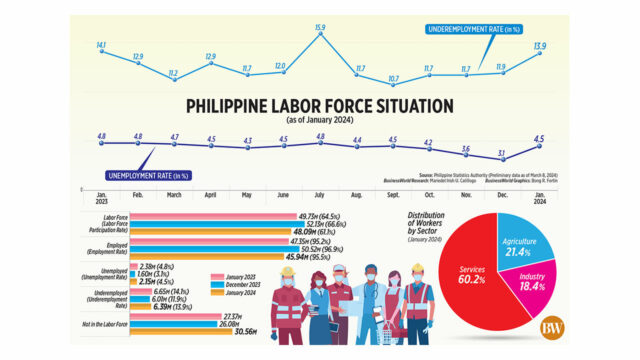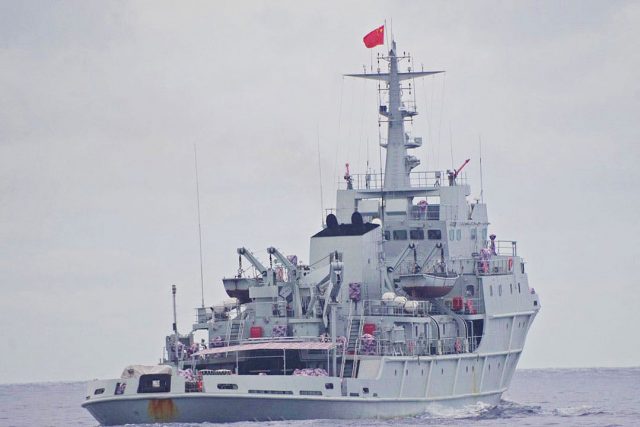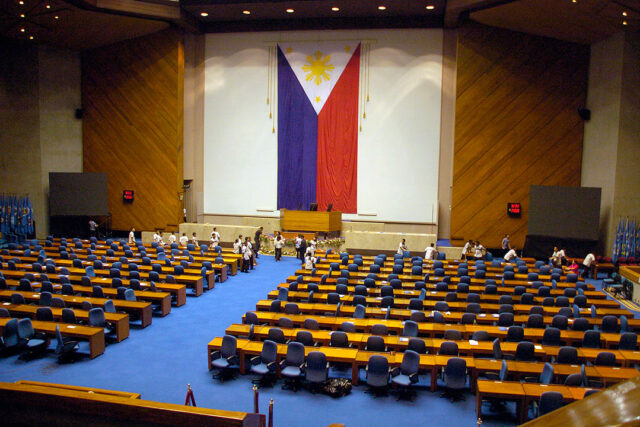By Kyle Aristophere T. Atienza, Reporter
THE PHILIPPINES should brace itself for an intensified presence of China in the South China Sea that is aimed at cementing its control of resources there, analysts said, as the Xi regime calls on the Chinese military to make its maritime strategy align with economic development.
Aside from building more military outposts in the waterway, China is also likely to put up maritime buffer zones seaward, Enrico Cau, an associate researcher at the Taiwan Center for International Strategic Studies, said in a Facebook Messenger chat.
Chinese President Xi Jinping last week called on his country’s armed forces to coordinate preparations for military conflicts at sea and help in the development of the maritime economy.
Mr. Cau said China could enforce a “threefold” strategy: resource control, geographic dominance, and denial of space from the other claimants.
“This means that China is not only trying to control the resources. It means that, likely, it is trying to use the resources while at the same time denying strategic access to both resources and strategic locations that could be exploited by others,” he said.
“The purpose of occupation would not be only resource exploitation. Rather a sustainable model that entails denial to others while developing resources in occupied areas,” he added.
Mr. Xi, speaking to a delegation of the People’s Liberation Army and police force at an annual parliament meeting last week, also underscored the need to build a defense system in cyberspace and boost his country’s national security network.
Chinese legislators, meanwhile, vowed to push for a set of new laws that would modernize China’s capacity for national security and safeguard its “sovereign interests.”
Following Mr. Xi’s remarks, the Philippines Department of National Defense (DND) said on Friday it had already launched the Comprehensive Archipelagic Defense Concept which, in plain language, means “we are developing our capability to protect and secure our entire territory and exclusive economic zone.”
Filipinos “shall freely reap and enjoy the bounties of the natural resources that are rightfully ours within our domain,” it said.
POLL: MOST FILIPINOS WILLING TO FIGHT A ‘FOREIGN ENEMY’
An OCTA Research poll conducted in December, which was commissioned by the Armed Forces of the Philippines, showed 77% of Filipinos were willing to fight for the country in case of a conflict with a “foreign enemy.”
“Across major areas, at least 60% of adult Filipinos are willing to fight for the country, with the highest percentage observed in Mindanao (84%) and the lowest percentage in Visayas (62%),” OCTA said in a statement on Sunday.
The highest percentage was recorded among those aged 45 to 54, at 87%. The lowest recorded percentage was among those aged 65 to 74 at 69%.
OCTA interviewed 1,200 adult Filipinos face-to-face nationwide from Dec. 10 to 14. The poll had a ±3% margin of error at a 95% confidence level.
CHINA HIKES MILITARY BUDGET, POSES ‘CIVIL-MILITARY FUSION’
Despite the bumpy road for its economy, which is threatened by a two-million drop in the Chinese population, soaring debt and declining foreign investments, China has increased its defense budget for 2024 year by 7.2%.
Its military is expecting a big boost this year as the Xi regime seeks to lower the costs for weapons acquisition.
“The comments relating to new quality fighting forces could be read, I believe, as a push to an overall improvement of the military,” Mr. Cau said. “The statements not only seem to signal a heightened attention towards military preparedness, but it also resonates with calls for the military to focus on real combat capabilities.”
Raymond M. Powell, a fellow at the US-based Gordian Knot Center for National Security Innovation, said Mr. Xi’s call for the military to be involved in economic matters is not really new since China does not draw a hard distinction between civilian and military matters.
“In fact, they engage in what is often referred to ‘civil-military fusion,’” he said in an X message.
“Xi has aggressively brought China’s civil and economic sectors under state control, and the state under Communist Party control,” he added. “What we’re watching is China embracing an authoritarianism bordering on Stalinism.”
China may have the industrial capacity to enforce Mr. Xi’s call for the Chinese military to dovetail its maritime presence with economic development, but “it will cost them over the long term,” Mr. Powell said.
The so-called civil-military fusion — an act liberal democracies avoid in favor of free markets — “provides authoritarian governments certain advantages at least in the short term,” he said. “However, it also has its downsides, to include a temptation for military officials toward graft.”
“Xi’s recent anti-corruption moves removing certain high-ranking military officers suggest that this likely remains a serious problem in China’s system,” Mr. Powell added.
Chester B. Cabalza, founder of Manila-based International Development and Security Cooperation, said China is expected to step up its expansionist agenda in the South China Sea to divert its citizens’ attention away from the country’s economic woes.
“This is Xi Jinping’s ‘wag the dog’ moment to make Xi Jinping immune from the weak economy today,” he said in a Facebook Messenger chat.
Forecasts from the International Monetary Fund show China’s growth will slow to 4.6% in 2024 from an estimated 5.4% last year.
China’s growth last year, which experienced ups and downs, was driven by the resilience of the high-tech and services sectors, “while challenges came from declining property investment, debt risk and weak consumption growth,” according to the East Asia Forum.
“I believe that the Chinese are aware that the costs of a war for China will be very high,” Mr. Cau said.
“Therefore, President Xi will try to avoid a war at any cost,” he noted, “However, should the necessity arise, China will not hesitate to fight.”
In the South China Sea, Beijing has been conducting aggressive moves that fall short of a shooting war, which maritime experts call gray zone operations.
The year 2023 saw increased tensions between the Philippines and China, whose coast guard and maritime militia forces have been conducting dangerous maneuvers and firing water cannons to block Philippine resupply missions within Manila’s 200-nautical mile exclusive economic zone.
In the face of an increasingly belligerent China, the Philippines under President Ferdinand R. Marcos, Jr. has pursued closer ties with the US and other Indo-Pacific powers such as Japan and Australia.
Just last month, the US and its treaty ally, the Philippines, conducted the air component of their Maritime Cooperative Activity’s third iteration, which began early in February. The two forces held their first and second joint patrols last year.
Japan and Australia last year expressed willingness to take part in the Philippines’ joint maritime patrols with the US.
The Philippines allocated P285.69 billion for defense sector in 2024 compared to the P203.4-billion allocation in 2023, but Mr. Cau said the country still “lacks the financial capabilities and the time to build sufficient deterrence to keep China at bay.”
“Recurrent flares of insurgency and other issues ashore are also bound to impact Philippines capability to entirely refocus on its maritime strategy,” he said.
“The sole solution for the Philippines remains the physical occupation of the areas, while wisely navigating cooperation and competition with China and its relations with the allies,” he added, noting that allies could provide a crucial role in preventing Chinese interference in Philippine reclamation and construction activities.
Mr. Cabalza said the Philippines should continue to “widen its diplomatic networks and allies,” in line with its efforts to help promote a rules-based order in the South China Sea.
Mr. Marcos, who has veered away from his predecessor’s pivot to China, will visit Germany and Czech Republic from March 11 to 15.
In Germany, the Philippine leader is expected to seal a cooperation agreement on maritime trade.















